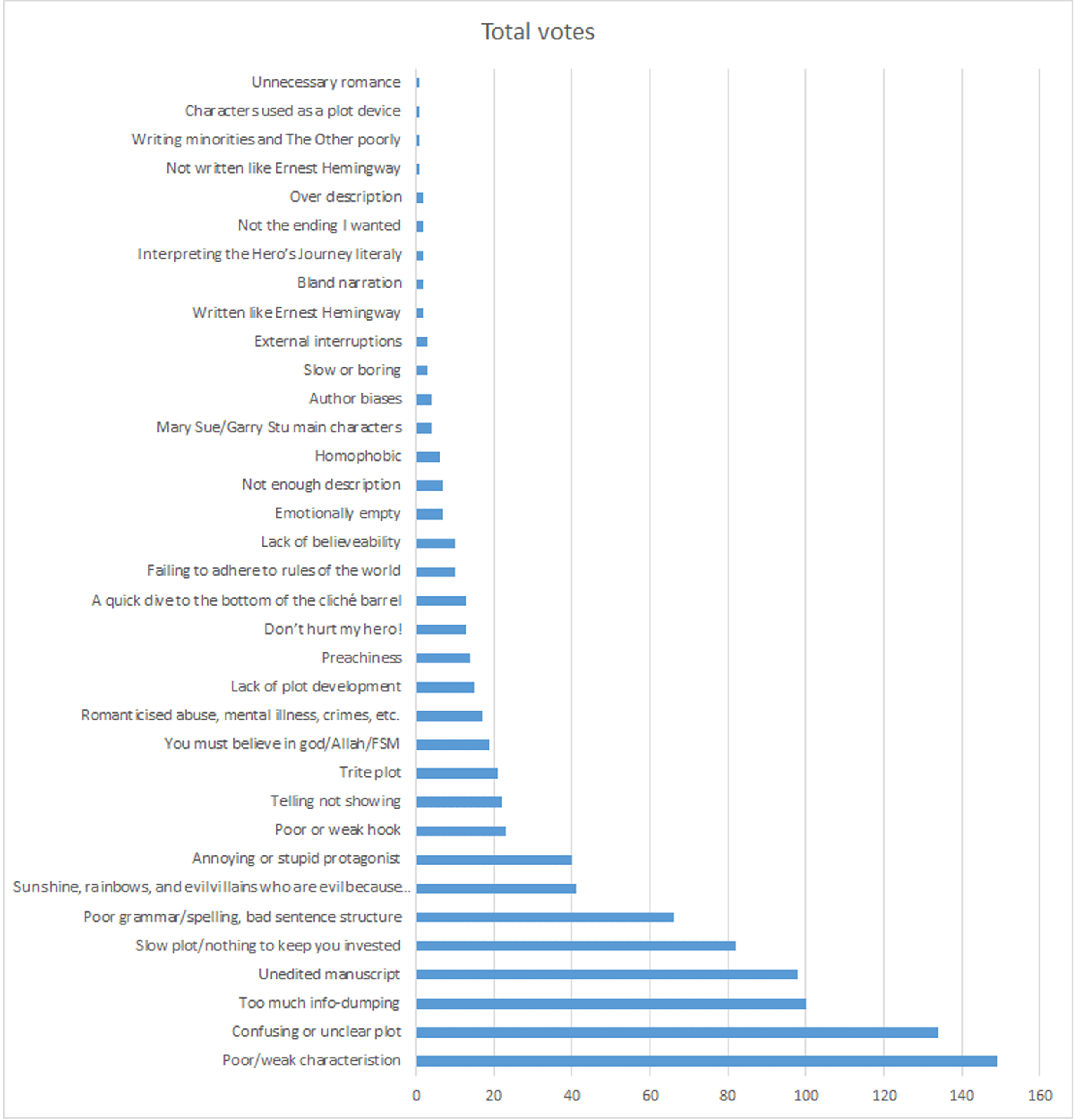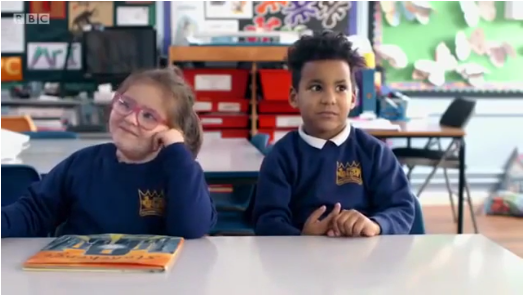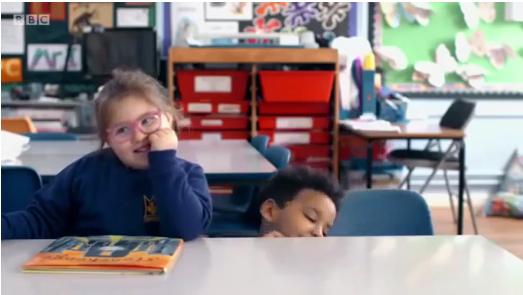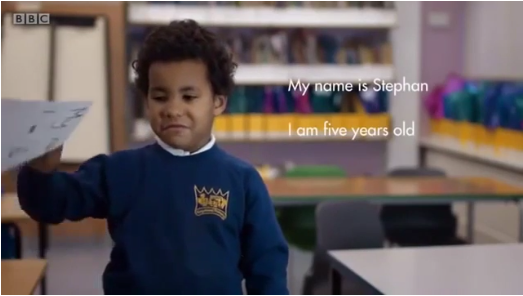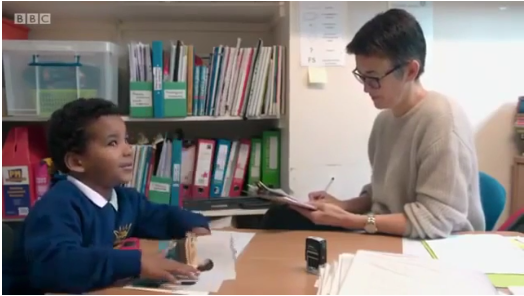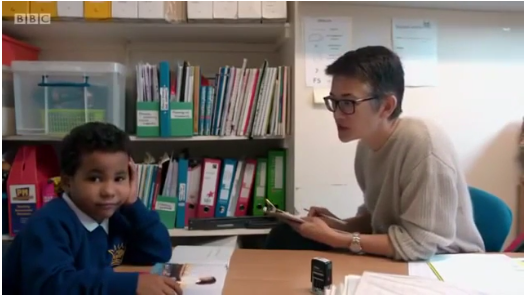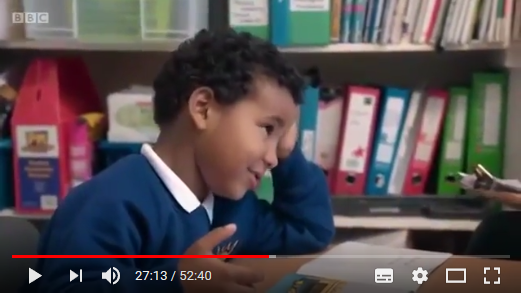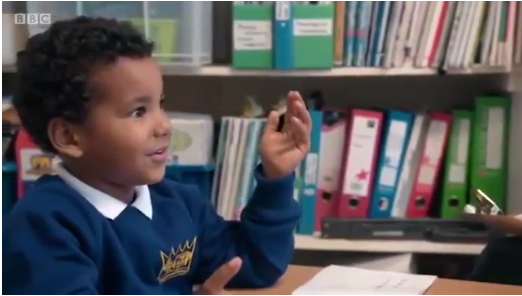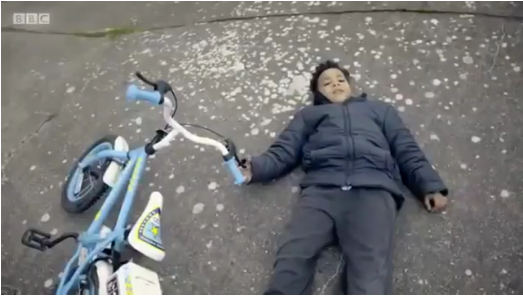Английская лексика на тему книг
1. Genres of Fiction Books
Жанры художественной литературы
1.1. Classics (Little women)
1.2. Tragedy (Romeo and Juliet)
1.3. Science Fiction (The war of the worlds)
1.4. Fantasy (Harry Potter)
1.5. Fairytale (Snow White)
1.6. Adventure (Treasure Island, The Hobbit)
1.7. Crime & Mystery (Sherlock Holmes)
1.8. Historical Fiction (Schindler’s Ark)
1.9. Humor (Charlie and the Chocolate Factory)
1.10. Fictional Diaries (The Diary of a Wimpy Kid)
1.11. Satire (The Picture of Dorian Gray)
1.12. Romance (Pride and Prejudice)
1.13. Horror (Dracula)
1.14. Dystopian (The Hunger Games)
2. Genres of Nonfiction Books
Жанры документальной литературы
2.1. Biography/Autobiography — биография / автобиография
Например:
The Diary of a Young Girl by Anne Frank
2.2. Memoirs — мемуары (воспоминания)
Например:
“Eat, Pray, Love” by Elizabeth Gilbert
2.3. Self-Help Book — книги по саморазвитию
Например:
“The 7 Habits of Highly Effective People” by Stephen Covey
“Men Are From Mars, Women Are From Venus” by John Gray
“Chicken Soup for the Soul” books by Jack Canfield and Mark Victor Hansen
2.4. Narrative Nonfiction — повествовательная документальная литература
Например:
“The Art of Travel” by Alain de Botton
2.5. Nonfiction Novels — документальные романы
Например:
“The Armies of the Night” by Norman Mailer
“Hidden Figures” by Margot Lee Shetterly
2.6. Reference Books — справочная литература
3. Описание книги / Содержание
be interested in … books — интересоваться … книгами
a real page-turner — очень интересная книга
a spine-tingling book — книга, вызывающая много эмоций (от которой мурашки)
a book with poignant moments — книга с трогательными (горькими, острыми) моментами
be a real tearjerker — сентиментальная книга
gripping/riveting — захватывающая
the plot is unraveling (unraveling of the plot) — запутанный сюжет
enchanting — очаровательная
informative — информативная
thought-provoking — наводящая на размышления
adventurous — приключенческая
whimsical — причудливая
a really good ending — действительно хороший финал
a boring book — скучная книга
a heavy-going book — тяжелая книга
too much information for me to take in — слишком много информации для меня, чтобы воспринять (понять)
textbooks on chemistry — учебники по химии
a coursebook — учебник
the book on globalization — книга на тему глобализации
a chapter of a book — глава книги
a copy of a book — примерник
a page of a book — страница книги
the title of a book — название книги
the covering — обложка
a hardback — книга в твёрдом переплете
a paperback book — книга в мягкой обложке
contents — содержание
a pile of books — стопка книг
the author of a book — автор книги
the well-know author — известный автор
an unknown author — неизвестный автор
to get good/bad review — получить хороший / плохой отзыв
an e-book — книга в электронном варианте
an e-reader — устройство для чтения электронных книг


4. Действия с книгой
to enjoy a book — наслаждаться книгой
to dip into the book — окунуться в книгу
to be engrossed in a good book — увлечься хорошей книгой
bed-time reading — чтение перед сном
read … as my bed-time reading
can’t fall asleep without some good bed-time reading — не может заснуть без хорошего чтения перед сном
to be only half-way through it — прочитать только половину книги
to give up on page 2 — сдаться на странице 2
to give up half-way through it — сдаться на полпути
to have 5 pages left to go — осталось 5 страниц дочитать
to browse through a book — пролистать книгу
to leaf through the book — листать книгу
to flick through — пролистать
to read a book from cover to cover — читать книгу от корки до корки
to lend a book to — одолжить книгу
to borrow a book from — взять книгу у
be intended for adults — предназначаться для взрослых
be not intended for children — не предназначаться для детей
be published — быть опубликованным
to put a book down on the table — положить книгу на стол

5. Описание человек
big reader — человек, который много читает
a book worm — книжный черв
always to have my nose in a book — всегда читать что-нибудь
avid reader — заядлый читатель
6. Expressions to talk about books
I see myself a bit in the character of… — Я вижу себя немного в образе …
Couldn’t put it down. — Не мог оторваться.
The story is based on… — История основана на…
The story (plot) grabbed me from the get-go. — История (сюжет) захватила меня с самого начала.
The story has characters that all have….
To cut a long story short… — Короче говоря…
It’s set in… — Это проходило (было) в …
7. Page
turn the page — перевернуть страницу
turn to page 5 — перейти на страницу 5
tear out a page — вырвать страницу
the front page — первая страница
the back page — задняя страница
a blank page — пустая страница
the opposite page — противоположная страница
be on page 35 — быть на странице 35
be over page … — быть на странице …
be at the top of the page — быть вверху страницы
be at the bottom of the page — быть внизу страницы

Репетитор английского языка
Видео на тему английской лексики для книг
На основании Вашего запроса эти примеры могут содержать грубую лексику.
На основании Вашего запроса эти примеры могут содержать разговорную лексику.
скучную книгу
скучная книга
However, don’t think this is a boring book.
But do not imagine that this is a boring book.
Therefore, a boring book, in which the characters just sit and philosophize, cannot be turned into a film.
Поэтому скучную книгу, в которой персонажи только сидят и философствуют, не экранизировать никак.
To put it bluntly, it’s a boring book.
I hear you’re reading a boring book.
Give a monkey a boring book to read and he’ll turn it into a musical.
Дайте Обезьяне скучную книгу для чтения, и она превратит её в мюзикл.
You might become impatient when watching a movie or a show that you do not like, or when reading a boring book.
Вы можете стать нетерпеливым при просмотре фильма или шоу, которое вам не нравится, или при чтении скучной книги.
It is not a boring book, quite the reverse.
And you, of course, know what a «magical» action a boring book has: it’s worth reading a couple of pages, and you are already asleep.
И вам, безусловно, известно, каким «магическим» действием обладает скучная книга: стоит прочитать пару страниц, и вы уже спите.
The books may be free, but that does not mean that you should be stuck with a boring book simply because it is free.
Книги могут быть бесплатными, но это не значит, что вы должны быть застряли в скучной книге просто потому, что это бесплатно.
It is a boring book by Jack London.
In order to make sure that the word «textbook» is not associated with a boring book, select the materials suitable for children’s age and interests.
Чтобы слово «учебник» у ребенка не ассоциировалось со скучной книгой, подберите подходящие его возрасту и интересам материалы.
Buy a boring book about Egypt from the guy that screwed Anna Scott.
Купите книжку у парня, завалившего Анну Скотт.
Then it’s like a boring book.
Getting through a boring book…
This is not a boring book!
Результатов: 18. Точных совпадений: 18. Затраченное время: 230 мс
Documents
Корпоративные решения
Спряжение
Синонимы
Корректор
Справка и о нас
Индекс слова: 1-300, 301-600, 601-900
Индекс выражения: 1-400, 401-800, 801-1200
Индекс фразы: 1-400, 401-800, 801-1200
Nelson Mandela-Long walk to freedom
I’m currently reading Nelson Mandel-Long walk to freedom is an autobiography. It’s an amazing book full of Nelsons work in the ANC, and the Defiance Campaign. The book encompasses everything in his life from his birth to whenever he had finished writing. It talks about his dealing in politics, time spent in prison. Nelson Mandela-Long walk to freedom is definitely a great book to read if you feel like looking for a book that will inspire you. Although its an extremely long book and the level of reading is quite high you will never regret opening this book.
Inheritance Cycle
Book series written by Christopher Paolini. An epic fantasy for all. If you get a chance I definitely recommend it even for just a light read.
There’s nothing worse than diving into some reading only to pick up a boring book. It can destroy your enthusiasm for the written word and may put you off books altogether.
From a writer’s perspective, the last thing we want is to write a dull book. We want to excite and entertain our readers. We want them to go away and tell their family and friends about your novel or story and encourage them to read it too.
So what makes us grimace and put down a book, never to pick it up again?
What annoys us so much we stick it in the corner of a shelf to gather dust for years before at last deciding to donate it to the charity shop?
There are so many boring books that we simply never finish. And sometimes we can find it hard to pinpoint why. Flat characters, static plot, bizarre dialogue… we could speculate for hours on various reasons.
Or we could do a bit of research. That’s what I decided to do.
I wrote to scores of book reviewers and book bloggers and undertook polls on a number of Facebook groups: AmWritingFantasy (693 members), Fantasy Writers Support Group (5,447 members), The Phoenix Quill (846 members), and Writing Bad (8,000 members). The results are very interesting and hopefully will be of use to writers worried about whether or not they’ve written a boring book.
First, we’ll look at what the book reviewers say, before taking a look at the poll results with reference to a few voter comments.
Choose A Chapter
- What Is A Boring Book?
- Why Do People Like Reading?
- Why Do People Stop Reading A Book?
- Poll Results – Why Do People Find A Book Boring?
- So What Makes For A Boring Book?
- Learn More About Why People Stop Reading
What Is A Boring Book?
A boring book is one in which the reader finds little excitement or enjoyment in reading.
There are many reasons why books could be deemed dull or boring, which we cover in greater detail below, but some of which include:
- Long descriptions of things that don’t really matter or aren’t relevant to the characters or plot. An example could be passages of worldbuilding-related text, also known as an infodump.
- Characters that aren’t likeable. Readers generally marry themselves to the cause of the characters or try to relate to them in some way. If none of this is possible, chances are they’ll find the book boring.
- A weak plot. If nothing happens in the story, particularly in the first few pages, people can switch off. As we’ll see, this lack of action is one of the main reasons why people describe a book as boring.
Generally, a captivating story and strong character development are two key things that make a book interesting to read.
Why Do People Like Reading?
Just like with people who get bored by books, there are reasons why people enjoy reading too. There’s plenty of research available on the internet that reveals the reasons why people like reading, some of which include:
- To learn something new, to gain knowledge, or to discover information. This reason would be more applicable to non-fiction than it would fantasy, though you can still teach through fictional works.
- Escapism. Many people, particularly fans of fantasy, like to immerse themselves in a new world to provide a distraction from their real life.
- For entertainment. Books are a valuable source of entertainment. People can fly through chapters and books in a few hours just like they would binge a TV show.
- As a form of relaxation. Reading is a great way to switch off from the troubles and anxieties of life.
Why Do People Stop Reading A Book
It’s time to turn our focus toward the research I conducted on why people find books boring.
A million thanks to the bloggers who kindly responded to my query. I appreciate you’re very busy and in taking the time to respond you’ve helped give this research more credibility.
This is the question I put to them:
“I’m just after a short paragraph explaining what your biggest pet peeve is when it comes to books. What makes you put down a book and banish it to the pits of hell?”
Here are their answers.
Charlotte Annelise
Website: https://charlotteannelise.wordpress.com/
Twitter: @charannelise
What really makes me want to throw a book I’m reading out the window is when the pacing is slow. Books need action to draw the readers in and make them invested in the story. When the plot is so boring that, I cannot even read for longer than a page, that is when I really feel like returning the book to my bookshelf where it will likely collect dust and never be thought of again. I recently DNF’d a book that had a scattered plot without a clear focus. This also attributes to the plot being mind-numbing and difficult to read. While a book’s plot does not need to be carved in stone, it helps if it includes interesting plot points that the readers know will be solved later in the story. If all the protagonist is doing is their normal day-to-day activities, it is hard for me to find a reason to keep reading. Thankfully, I rarely find books to be so boring that I want to DNF it, so I think most authors are able to make their stories thrilling enough for me to keep reading.
B.B. Morgan
Website: https://bbmorganblog.wordpress.com/
Twitter: @BBMorgan_W
The number one reason why I stop reading a book is the writing. I can read anything that’s well written, be it nonfiction about Nebraska or a YA romantic fantasy. The writing needs to be engaging. I’m not just talking about having A+ grammar and punctuation, I’m talking style. I’ll give you the short version (bullet points!) of my turn-offs when it comes to writing: 1) stupid dialog 2) stage-direction narration 3) boring, repetitive sentence structure 4) purple prose that doesn’t go anywhere or adds anything 5) using big words where smaller words would have sufficed and 6) telling, not showing.
Kerry Parsons
Website: https://chataboutbooks.wordpress.com/
Twitter: @bellaboobos11
Thankfully I haven’t had to give up on many books. Some are obviously more memorable than others, but I generally enjoy them at the time. Books I haven’t got on with tend not to flow well for me. If it’s too much like hard work trying to keep track of everything and everyone I will lose interest. I always worry that there’s something I’m missing though, especially if it’s a book most people have loved. Characters can sometimes be a turn off too. Not necessarily unlikeable characters, because they can be interesting, but characters I just don’t gel with at all for whatever reason. If they irritate me I might not care what happens to them and lose interest in their story. Then again, some get under your skin, however irritating, and make their stories all the more compelling. It really does vary. Character and place names which are hard to pronounce can be off-putting too, sometimes. If I find myself not really bothered about reading that next chapter then I know a book isn’t working for me and sometimes it’s hard to pinpoint why. Life is too short though and my TBR list is way too long to spend time reading something I’m not enjoying. There’s always an element of guilt though as I know how much hard work goes into writing, but it would be a boring world if we all loved the same things.
TheGirlOnTheGo
Website: https://wordscantfathom.wordpress.com/
Twitter: @TheGirlOnTheGo8
Books provide me a secret escapade when I really need a break from reality. But that was before. Now, I can’t go without a book even for a day. And sleeping with a book by my bedside is a must, it doesn’t matter if I don’t read, it just has to be there.
So when it comes to my biggest pet peeve concerning books, I must admit I really hate a poorly written one, and by that I not only refer to the writing style, but also the various proofreading and editing errors that surface every now and then. That just makes me cringe and I feel like shutting the book for good.
Jason P. Crawford (Beyond the Curtain of Reality)
Website: http://curtainofreality.blogspot.co.uk/ / http://www.jasonpatrickcrawford.com/home.html
Twitter: @jnewmanwriting
The main thing that makes me banish a book is a clear lack of story flow. This can come in a few forms – if the prose is choppy and ridden with grammar errors, then I can’t keep reading; if the writer drops a huge block of exposition in my lap right off the bat, then I’m going to put it down. I wouldn’t consider myself a picky reader, but if I can’t immerse myself in your story because your errors or style keep me out of it, then I’m not going to give it my time.
Poll Results – Why Do People Find A Book Boring?
At 14,986 the sample size was pretty big. I chose the above-listed groups because they have the most active members.
Polls were open for a week. It’s hard to give a definite figure on how many people took part—people could vote more than once and Facebook doesn’t give much analysis. Voters were allowed to propose their own reasons as well as voting for existing ones. In all, thirty-five different reasons were put forward, some of which overlap.
| Reason | Total Votes |
| Poor/weak characterisation | 149 |
| Confusing or unclear plot | 134 |
| Too much info-dumping | 100 |
| Unedited manuscript | 98 |
| Slow plot/nothing to keep you invested | 82 |
| Poor grammar/spelling, bad sentence structure | 66 |
| Sunshine, rainbows, and evil villains who are evil because They are evil. Oh, and the good guys inevitably win because they’re good |
41 |
| Annoying or stupid protagonist | 40 |
| Poor or weak hook | 23 |
| Telling not showing | 22 |
| Trite plot | 21 |
| You must believe in god/Allah/FSM | 19 |
| Romanticised abuse, mental illness, crimes, etc. | 17 |
| Lack of plot development | 15 |
| Preachiness | 14 |
| Don’t hurt my hero! | 13 |
| A quick dive to the bottom of the cliché barrel | 13 |
| Failing to adhere to rules of the world | 10 |
| Lack of believability | 10 |
| Emotionally empty | 7 |
| Not enough description | 7 |
| Homophobic | 6 |
| Mary Sue/Garry Stu main characters | 4 |
| Author biases | 4 |
| Slow or boring | 3 |
| External interruptions | 3 |
| Written like Ernest Hemingway | 2 |
| Bland narration | 2 |
| Interpreting the Hero’s Journey literally | 2 |
| Not the ending I wanted | 2 |
| Over description | 2 |
| Not written like Ernest Hemingway | 1 |
| Writing minorities and The Other poorly | 1 |
| Characters used as a plot device | 1 |
| Unnecessary romance | 1 |
And in graph form, because what’s a bit of research without a graph?
So What Makes For A Boring Book?
An important thing to remember is that reading is subjective. One person may laud something another loathes. To quote Kerry Parsons above, “it would be a boring world if we all loved the same things.”
But a few consistent trends have arisen and it’s something worth paying attention to. Strong characters and plot make the reader keep turning the page. This is something I agree with entirely. The reason I kept on reading Patrick Rothfuss’s The Name of the Wind was that I liked Kvothe so much. As one voter commented:
“Plot and characters are everything. If I don’t care what happens to the characters and I have no idea what going on because someone is piling on foreshadowing but solving nothing, it’s unreadable.”
Too much exposition, i.e. the info dump, is another big problem for readers. This is something I discussed back in January with fantasy author Jesper Schmidt of AmWritingFantasy.com. We had a chat about a rising trend of writers taking a minimalist approach to creating fantasy worlds, which I suggested may be the result of complaints of too much detail being revealed about worlds, invariably leading to not-so-sexy info dumps. Here’s what the voters had to say:
“Books traditionally published have a hard time gripping me when there’s a lot of info-dumping, the exposition is too flowery/unnecessary.”
“Some things, like info dumps or bad sentence structures, usually show themselves on page 1, so if I see a lot of those I will put down a book almost immediately”
An unedited manuscript is another big reason for people putting down books. Jason P. Crawford said above: “If the prose is choppy and ridden with grammar errors, then I can’t keep reading.” But interestingly readers do forgive the odd error provided the story has other strengths, as these comments from voters suggest:
“Give me phenomenal characters and most everything else is forgivable.”
“Make the first chapter as perfect as possible so all I see is the wonderful story and characters, then I will be forgiving of errors later.”
“I can deal with unedited provided the story is actually still strong.”
This is not an excuse to skip or rush editing. It’s the most important aspect of the writing process, for me anyway. I understand why writers can get impatient. You’ve finished your story and just want to get it out to the world. But would a painter sell a half-finished painting? Probably not, unless they’re trying to pass it off as modern art.
Learn More About Why People Stop Reading
We’ve nearly finished our look at the reasons why people stop reading a book. And haven’t they proven fascinating? Can you relate to any of them? If so, please comment below with your thoughts.
Before I leave you, I wanted to point you in the direction of some other great resources you may find useful:
- Click here for a list of 200+ fantasy magazines and journals
- Or head here for a list of fantasy writing groups
- If you’re looking for book reviewers, this page will help you too. There are over 100+!
- Click here for a study looking at the impact of pleasure reading on academic success.
- Or head here for a guide on reading techniques from Dartmouth University
- And look here to check out the UK government’s research piece on the benefits of pleasure reading
If you have any other questions about the challenges of reading a boring book, please get in touch.
- Author
- Recent Posts
Richie Billing writes fantasy fiction, historical fiction and stories of a darker nature. He’s had over a dozen short stories published in various magazines and journals, with one adapted for BBC radio. In 2021 his debut novel, Pariah’s Lament, an epic fantasy, was published by Of Metal and Magic. Richie also runs The Fantasy Writers’ Toolshed, a podcast devoted to helping writers improve their craft.
Most nights you can find him up into the wee hours scribbling away or watching the NBA.
13 Replies
I’ve just watched a great 2016 BBC4 documentary called “B is for book”. It follows a group of London children from their first day at school for a year, and explores how they learn to read.
The kids live on a public housing estate in Hackney, and most speak languages other than English at home.
The film is not currently on the BBC website, but a few people have put it on YouTube. The version I watched is here, and you might like to keep it open in a new tab while you read, so you can quickly find and watch the interesting bits I describe below.
You’ll love all the children, but I was most entranced by a little boy called Stephan. An honest child with a low tolerance for Educrap, he looks and behaves a lot like a little boy I worked with last year, also a twin from public housing inclined to slide under the table.
At 19:42 on the video clock, the two children having the most difficulty learning to read in the film, Maria and Stephan, are asked, “What’s the hardest word you know how to spell?” First, they do this:
Then they do this:
Stephan is clearly a smart child who would rather be seen as the naughty kid than the dumb kid. Too often, children like him end up stuck in the naughty corner, or being the class clown to distract from their reading and spelling difficulties.
Teaching “letter sounds”
The film contains nice examples of children confusing letter names and sounds, and being set up to fail by applying what they’ve been taught, for example at 9:35 on the video clock.
At 24:55 on the video clock, Stephan also demonstrates the idiocy of teaching children about “letter sounds” in short, CVC words like “hen” and “bus”, then asking them to read text containing spelling patterns and word structures they’ve never been taught. He is asked to read the text, “My name is Stephan. I am five years old”.
He points to the letters in the word “name” and says “Nuh, ah, muh, eh…..nam”.
He points to the letters in the word “five” and says “fuh, ih, vuh, eh….fin”.
He points to the letters in the word “years” and says “yuh, eh, ah, kuh, ss…kaz”.
At least some of the adults in Stephan’s life clearly need a lesson in how to say phonemes crisply and correctly (see my blog post here for videos relevant to Australian English), and perhaps also how to teach blending (here’s a free course that includes this).
When he’s finished trying to read each word, the person behind the camera asks him to read the whole thing. Obviously, he can’t do this, since he can’t read the individual words.
Stephan thinks for a moment, holds the paper up, and allows it to drop to the floor.
I am out of my chair, cheering for Stephan.
B is for boring
At 26.13 on the video clock there’s a textbook lesson on how NOT to teach reading.
This utterly cringeworthy type of session sadly still happens in schools all round the English-speaking world, including some of my own local schools, because teachers have not been trained and equipped to do better by universities, bureaucracies and publishers.
Stephan is working 1:1 with a well-meaning literacy intervention teacher who has perhaps been trained in a program like Reading Recovery or Leveled Literacy Intervention. She gives him a predictable book and tells him it’s called “On the table”.
Stephan opens the book and the first page says: “The little car is on the table”.
He looks at it, looks at the person behind the camera, and says, “I really don’t know how to read books”.
Look at his facial expression. The session is a farce, and he knows it.
The teacher says, “Really? What do you think is happening in the picture?” (AAARGH!! Stop telling children to guess words from pictures, and give them books they can actually read).
Stephan looks at the picture, says “A toy car is on a table”, and rolls his eyes. I am seriously in love with this child.
The teacher tells him, untruthfully, “Well, that’s exactly what this says, it says, look, ‘The … little … car … is … on … the table”.
She points to each word as she reads it, seeming unaware that he isn’t watching, because he’s looking at the picture, as he was told to do.
The book continues:
- The little doll is on the table
- The little ball is on the table
- The little plane is on the table
- The little bus is on the table
Stephan’s understandable contempt for this ludicrous activity is palpable. He knows he’s not really reading.
He rolls his eyes, puts his head in his hands, and says in a sarcastic tone, “The doll is on the table, the ball is on the table, and a plane is on the table”, and then whispers “boring”.
The teacher is writing on a clipboard and ignores this honest feedback, so he continues, “A bus is on a table, bo-ring. THIS is a BORING book.”
OMG I couldn’t agree more. Not only is it boring, it’s teaching him to guess, not read.
Stephan is in his first year of schooling. Has he been taught about “ar” as in “car”, “a” as in “ball”, “le” as in “table” and “little”, or “a…e” as in “plane”? I doubt it. Yet he’s being asked to read words containing these spellings.
This is happening all round the country, people, and it needs to stop.
Books like this are both as dull as dishwater and pedagogically awful. They teach the habits of weak readers (guessing from pictures and context) not the habits of strong ones (sounding unfamiliar words out).
The best and highest use I can think of for such books is cutting them up for pictures, to make greeting cards and collages in art, though I’m not sure Mum wants a picture of a little plane on a table on her Mother’s Day card.
Young children should be taught to read using decodable books that contain the sound-spelling correspondences they have been taught (I’ve just discovered new printable sets here and here, or my list of all the decodable books I’m aware of is here). If you’re in Victoria please support the Dyslexia Victoria Support campaign for decodable books for all school beginners.
Anyone who thinks Stephan is reading anything in this part of the video really should not be teaching reading.
The slippery slope from can’t to won’t
At 35.00 on the video clock we see Stephan falling off his bike on a skate ramp, mucking around in class, getting in trouble for not doing his work, and missing out on playtime.
Adults are starting to query his ability to pay attention and his motivation, and comparing him unfavorably with his twin brother. “Hurry up and give him better intervention”, I said between gritted teeth.
Thankfully, Stephan doesn’t go down the slippery can’t-to-won’t slope, and at 42:17 we see him reading high-frequency words successfully, and saying “Daddy believes in me”.
At 42.40, this great little child philosopher highlights the importance of teachers knowing when children learn each speech sound, by pointing out the homophones (in his five-year-old speech) “day” and “they”. Kids often can’t say the sounds represented by “th” (there are two, a voiceless one as in “thigh” and a voiced one as in “thy”) till age eight, three years after we expect them to deal with how these sounds are spelt.
By 50:55 on the video clock, Stephan can read pretty well, and the intervention teacher has (PTL) stopped telling him to guess words. Luckily for Stephan, except in at least some of its 1:1 intervention sessions, the school does seem to use a systematic, explicit, synthetic phonics program, something lacking in most schools in Australia.
The child-under-the-table of whom Stephan reminds me did intensive, systematic phonics in a weekly, 30-minute small group with me last year. I visited the school each week for a bit over six months, and provided the resources for this and three other groups, working with a teacher who continued the program on the other four school days.
At the end of our second-last session, the kids were quietly reading Level 1 Sound Out Chapter Books (try a free one on your iPad here) before doing some written work about them from related workbooks, when Mr No-Longer-Under-The-Table looked up and said, apropos of nothing, “I used to hate reading, but now I LOVE it!” The other kids went “meh” and kept reading, but the teacher and I are still high-fiving.
I hope these days Stephan can also honestly say, “I used to hate reading, but now I LOVE it!”, and has stopped getting into trouble and falling off his bike. I’ll embed the link to this great BBC4 documentary below, so it’s easy for you to watch when you next have a spare 52 minutes. Thanks to Debbie Heppelwhite for reminding me about this film.
If you want boring… read William Bennett’s Book of Virtues.
I will read this horrible book with this very boring title… that does not include zombies or Stormtroopers.
Раз так, прочитаю эту жуткую книгу со скучным названием, в которой не найти ни зомби, ни штормовиков.
This book will be good for people who do not like reading long and boring texts with trivial tips.
Книга будет полезна людям, которые не любят читать длинные и скучные тексты с тривиальными советами.
Look, I don’t have time to read all your boring parenting books.
Послушай, у меня нет времени на чтение всех твоих скучных книг по воспитанию.
I’m so
bored
with my book question, James.
Меня достали вопросы о моей книге, Джеймс.
Read a book if you’re
bored.
Будешь скучать, почитай книжку.
I think you’re a Patterson wannabe, and I think your last book was a boring retread.
Думаю, вы подражаете Паттерсону, а ваша последняя книга— скучная нудятина.
Results: 125024,
Time: 0.1394
English
—
Russian
Russian
—
English
What is another word for “boring”? List of 95+ words you can use instead of “boring” in English with examples. Learn these synonyms for “boring” with ESL picture to increase your English vocabulary.
Table of Contents
Boring Synonym
Other Words for “Boring”
Widely used synonyms for “Boring”.
- Dull
- Uneventful
- Dry
- Stale
- Uninteresting
- Monotonous
- Mind-numbing
- Repetitive
- Tedious
- Uninspiring
- Banal
- Bland
- Mundane
- Blah (slang)
- Bore shitless
- Bunk
- Beat
A huge list of 95+ words you can use instead of “boring”.
- Annoying
- Arid
- Banal
- Beat
- Blah (slang)
- Bland
- Bore shitless
- Bored
- Bunk
- Burdensome
- Common
- Commonplace
- Dead
- Deadly
- Depressing
- Dim
- Dismal
- Dispiriting
- Drab
- Drag
- Drear
- Dreary
- Drudging
- Dry
- Dull
- Dull as dishwater
- Exhausting
- Fatiguing
- Flat
- Grey
- Hackneyed
- Heavy
- Ho-hum
- Humdrum
- Insipid
- Interminable
- Irksome
- Irritating
- Jading
- Jejune
- Lame
- Leaden
- Lifeless
- Long-winded
- Matter-of-fact
- Mind-numbing
- Monotonous
- Mundane
- Normal
- Nothing
- Old
- Ordinary
- Pedestrian
- Perforating
- Piercing
- Plain
- Ponderous
- Prolix
- Prosaic
- Punching
- Reaming
- Repetitious
- Repetitive
- Routine
- Run-of-the-mill
- Slow
- Soporific
- Spiritless
- Stale
- Stereotyped
- Stodgy
- Stuffy
- Stupid
- Tame
- Tedious
- Threadbare
- Tired
- Tiresome
- Tiring
- Trite
- Uneventful
- Unexciting
- Unimaginative
- Uninspired
- Uninspiring
- Uninteresting
- Unoriginal
- Unvaried
- Usual
- Vapid
- Verbose
- Wearing
- Wearisome
- Weary
- Wearying
- Wishy-washy
Boring Synonyms with Examples
Dull
- Example: The first half of the game was pretty dull.
Uneventful
- Example: Anna led a quiet, uneventful life.
Dry
- Example: Government reports tend to make dry reading.
Stale
- Example: Their marriage had gone stale.
Uninteresting
- Example: The food was dull and uninteresting.
Monotonous
- Example: He has a monotonous voice.
Mind-numbing
- Example: It’s a mind-numbing conversation.
Repetitive
- Example: Such a repetitive task!
Tedious
- Example: The journey soon became tedious.
Uninspiring
- Example: The view from the window was uninspiring.
Banal
- Example: This is a banal conversation about the weather.
Bland
- Example: This soup is too bland for me.
Mundane
- Example: I found the job very mundane.
Blah (slang)
- Example: This class is so blah.
Bore shitless
- Example: That book will bore you shitless.
Bunk
- Example: This party is bunk.
Beat
- For example: When we got to that party, it was beaten.
Another Word for Boring | Image
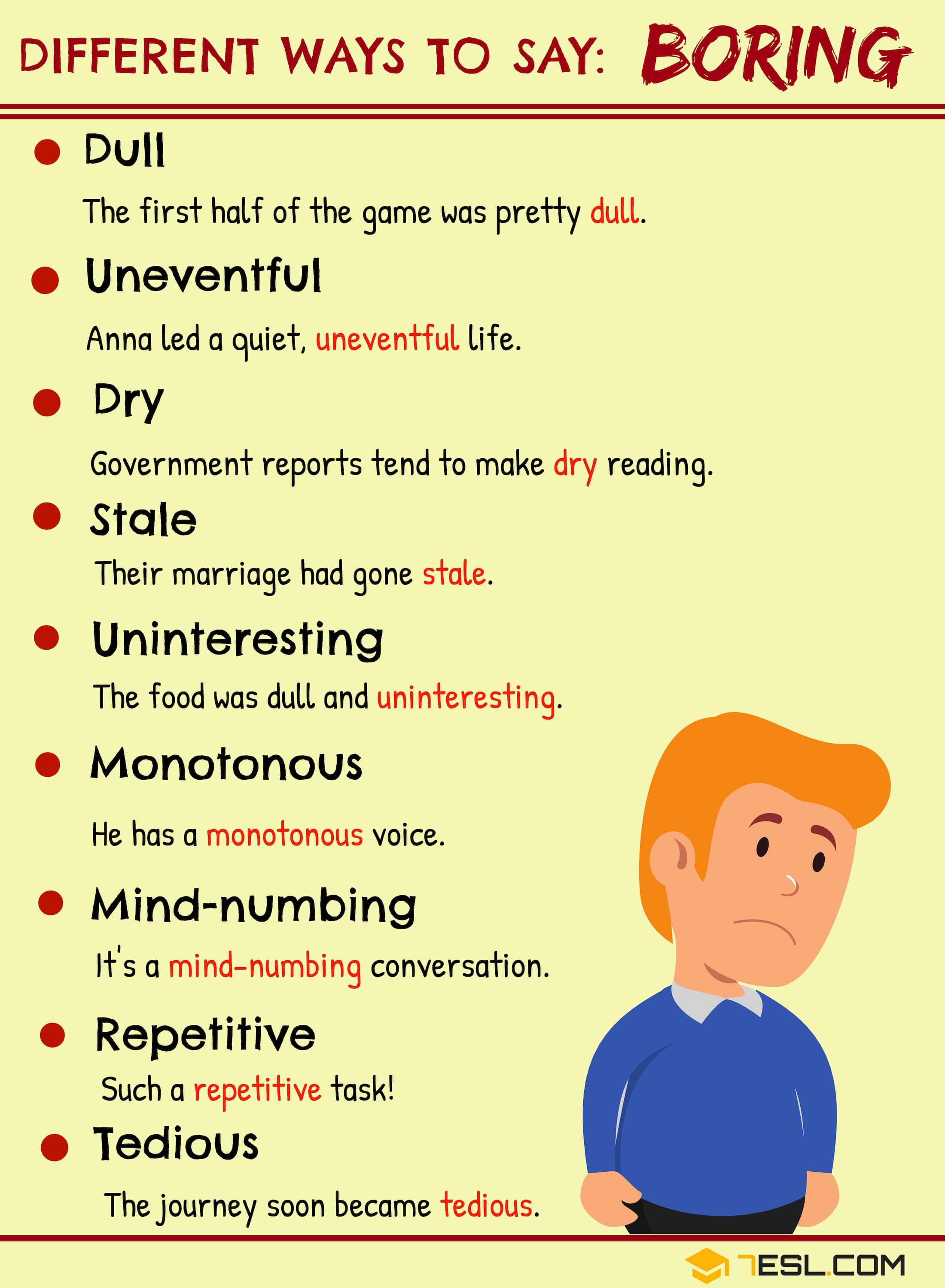
Last Updated on January 11, 2021
What is another word for Boring?
-
uninteresting, characteristic
-
uninteresting, characteristic
-
uninteresting, characteristic
-
uninteresting, character trait
-
characteristic, sorrowful
-
Use filters to view other words, we have 1302 synonyms for boring.
If you know synonyms for Boring, then you can share it or put your rating in listed similar words.
- APA
- MLA
- CMS




